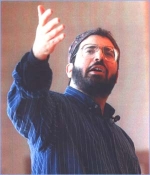Weekly Parsha / Torah Portion Subscribe
A selection of initiatives, blogs, resources and communities on Jewcology which focus on the weekly Torah portion.
Blogs
When is the right time?
I was having a good deal of trouble figuring out what I wanted write about this month on Jewcology. As I was searching for a topic I thought about doing a search for Jewish environmental poetry. The first passage that came up in my search was the following: Kohelet (Ecclesiastes) 3:1-8 For everything there is a time and a season for every experience under the heavens: A time to birth and a time to die, A time to plant and a time to uproot the planted; A time to kill and a time to heal, A time to breach and a time to build; A time to cry and a ...
Jewcology Launches Year of Jewish Learning on the Environment!
This Tu b'Shevat, Jewcology will launch a major new program: a Year of Jewish Learning on the Environment, in partnership with Canfei Nesharim. Between Tu b'Shevat 5772 and Tu b'Shevat 5773, we will roll out our "Core Teachings" series, 18 sets of resources exploring the connection between Jewish texts and our response to today's environmental challenges. Topics range from Trees, Food and Energy to Shabbat, Sustainable Use and Consumerism. For each topic, we will be providing a long article (2000 words), short article (800 words), ...
Veguary for the Environment
The month of February has become “Veguary” for hundreds of people around the world. A combination of the words vegetarian and February, Veguary describes a new trend to “pledge to be a veg,” or to commit to eliminating or reducing meat eating habits for one month each year. Initiated by three students at Manhattan’s Abraham Joshua Heschel School, Veguary is gaining popularity around the world as it encourages awareness of the environmental and health problems that can be caused by overconsumption of meat. Read more about Veguary and find a ...
Take Care Reproducing Documents (CJN May 2011)
This "Sustainable Jew" column originally appeared in the Canadian Jewish News May 12, 2011 We are now in “sphirat ha-omer,” the count-up to Shavuot—the time of the giving of our Torah. Our study and transmission of our Written and Oral Laws ("Torah Shebichtav" and "Torah Sheba'al Peh," respectively) has benefitted from technological advancement. We are known as the “People of the Book”—five books of Moses, 24 books of Tanakh, countless written commentaries—but many are beginning to find ...
Seeds
(reposted from Rabbi Nina Beth Cardin's blog: http://blog.bjen.org/ dated January 6, 2012) In Genesis 1, on the sixth day, God creates man and woman after having created all the rest of Planet Earth. In a gracious effort to provide some guidance, some instruction to these bewildered, befuddled neophytes on how this novelty of life could possibly work, God says, "Look around. All this grandeur is there for you." 28 God blessed them and said to them, “Be fruitful and increase; fill the earth and subdue it. Rule over the fish in the sea and ...
The Tower of Babel
I’ve been thinking lately how all stories are created in the image of their tellers, and all tellers are created in the image of life, and all life is created in the image of the Holy One, Tzelem Elohim. In this way, all stories contain sparks of holiness. After all, Reb Nachman of Bratzlav says that every story has something that is concealed. What is concealed? Nothing less than the hidden light from the beginning of creation! This is why no story is too small for our attention. For instance, this past week, Noah receives so much attention, and ...
thoughts about sustainability – from Noach to Abraham
Einat Kramer “And the bow shall be in the cloud; and I will look upon it, that I may remember the everlasting covenant between God and every living creature of all flesh that is upon the earth.” Genesis 9:16 Parshat Noach details a terrible ecological disaster, the Flood that immerses the world in water and brings an end to all life – all because of man’s despicable behavior. In this parsha we meet Noach, the first “environmental activist” who acted upon a divine commandment to keep every species of animal ...
The Holiness of Eating
This weeks Torah parsha, Shemini, begins on the eighth day of the ceremony to ordain the priests and consecrate the Tabernacle. Moses instructed Aaron to assemble several types of animals and a meal offering as sacrifices (called korbanot in Hebrew) to God, saying: “Today the Lord will appear to you." (Leviticus 9:1–4.). At one point, Moses becomes angry at Aaron and his sons for failing to eat the sin offering at the proscribed time and place. The parsha concludes with a listing of which animals are considered clean and therefore permissible ...
Hazon Food Conference 2010
Below is the text to a drash/show and tell that I gave this week at my shul in honor of Tu B'Shvat: For a version of this blog post with working links and photos, please visit my personal blog. This week’s parsha has an interesting sequence of events. Probably the event that stands out the most is the crossing of the Yam Suf. This is an enormous miracle that is exciting and triumphant. The part we talk about a little less frequently is what comes after this sort of birth out of Egypt and into Hashem’s care. After the singing and dancing ...






